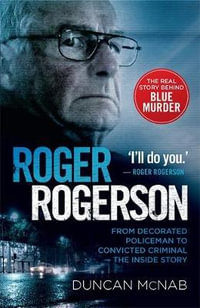This book has been remaindered by the publisher and may have a small mark on the top or bottom edge to indicate this.
Please note the pages on this book have been produced with bevelled or rough edge to create an old style look. The publisher has deliberately chosen to produce the book this way.
Product Description
Selected by the Modern Library as one of the 100 best nonfiction books of all time
Thirty years ago, The Rise of Theodore Roosevelt won both the Pulitzer Prize and the National Book Award. A collector's item in its original edition, it has never been out of print as a paperback. This classic book is now reissued in hardcover, along with Theodore Rex, to coincide with the publication of Colonel Roosevelt, the third and concluding volume of Edmund Morris's definitive trilogy on the life of the twenty-sixth President.
Although Theodore Rex fully recounts TR's years in the White House (1901-1909), The Rise of Theodore Roosevelt begins with a brilliant Prologue describing the President at the apex of his international prestige. That was on New Year's Day, 1907, when TR, who had just won the Nobel Peace Prize, threw open the doors of the White House to the American people and shook 8,150 hands, more than any man before him. Morris re-creates the reception with such authentic detail that the reader gets almost as vivid an impression of TR as those who attended. One visitor remarked afterward, "You go to the White House, you shake hands with Roosevelt and hear him talk-and then you go home to wring the personality out of your clothes."
The rest of this book tells the story of TR's irresistible rise to power. (He himself compared his trajectory to that of a rocket.) It is, in effect, the biography of seven men-a naturalist, a writer, a lover, a hunter, a ranchman, a soldier, and a politician-who merged at age forty-two to become the youngest President in our history. Rarely has any public figure exercised such a charismatic hold on the popular imagination. Edith Wharton likened TR's vitality to radium. H. G. Wells said that he was "a very symbol of the creative will in man." Walter Lippmann characterized him simply as our only "lovable" chief executive.
During the years 1858-1901, Theodore Roosevelt, the son of a wealthy Yankee father and a plantation-bred southern belle, transformed himself from a frail, asthmatic boy into a full-blooded man. Fresh out of Harvard, he simultaneously published a distinguished work of naval history and became the fist-swinging leader of a Republican insurgency in the New York State Assembly. He had a youthful romance as lyrical-and tragic-as any in Victorian fiction. He chased thieves across the Badlands of North Dakota with a copy of Anna Karenina in one hand and a Winchester rifle in the other. Married to his childhood sweetheart in 1886, he became the country squire of Sagamore Hill on Long Island, a flamboyant civil service reformer in Washington, D.C., and a night-stalking police commissioner in New York City. As assistant secretary of the navy under President McKinley, he almost single-handedly brought about the Spanish-American War. After leading "Roosevelt's Rough Riders" in the famous charge up San Juan Hill, Cuba, he returned home a military hero, and was rewarded with the governorship of New York. In what he called his "spare hours" he fathered six children and wrote fourteen books. By 1901, the man Senator Mark Hanna called "that damned cowboy" was vice president of the United States. Seven months later, an assassin's bullet gave TR the national leadership he had always craved.
His is a story so prodigal in its variety, so surprising in its turns of fate, that previous biographers have treated it as a series of haphazard episodes. This book, the only full study of TR's pre-presidential years, shows that he was an inevitable chief executive, and recognized as such in his early teens. His apparently random adventures were precipitated and linked by various aspects of his character, not least an overwhelming will. "It was as if he were subconsciously aware that he was a man of many selves," the author writes, "and set about developing each one in turn, knowing that one day he would be President of all the people."
About the Author
Edmund Morris was born in Nairobi, Kenya, in 1940. He was schooled there, and studied music, history, and literature at Rhodes University, Grahamstown, South Africa. After leaving Africa at the age of twenty-four, he worked for six years as an advertising copywriter in London and New York. He became a full-time writer in 1972. His first book, The Rise of Theodore Roosevelt, began life as a screenplay. It was published in 1979 and won the Pulitzer Prize and National Book Award. In 1985, Morris was appointed the official biographer of President Ronald Reagan. The resultant work, Dutch: A Memoir of Ronald Reagan, was and remains controversial because of its revolutionary narrative technique. Theodore Rex, the second volume of Morris's Roosevelt trilogy, won the Los Angeles Times Book Award for biography. Before completing his trilogy with Colonel Roosevelt, Morris published a short life of Beethoven. He lives in New York and Kent, Connecticut, with his wife and fellow biographer, Sylvia Jukes Morris.
Industry Reviews
Praise for "The Rise of Theodore Roosevelt"
"Magnificent . . . one of those rare works that is both definitive for the period it covers and fascinating to read for sheer entertainment."--"The New York Times Book Review"
"A towering biography . . . a brilliant chronicle."--"Time"
"Theodore Roosevelt, in this meticulously researched and beautifully written biography, has a claim on being the most interesting man ever to be President of this country."--"Los Angeles Times Book Review"
"Spectacles glittering, teeth and temper flashing, high-pitched voice rasping and crackling, Roosevelt surges out of these pages with the force of a physical presence."--"The Atlantic Monthly"
"[Morris's] prose is elegant and at the same time hard and lucid, and his sense of narrative flow is nearly flawless. . . . The author re-creates a sense of the scene and an immediacy of the situation that any skilled writer should envy and the most jaded reader should find a joy."--"The Miami Herald"
"A monumental work in every sense of the word . . . a book of pulsating and well-written narrative."--"The Christian Science Monitor"
























